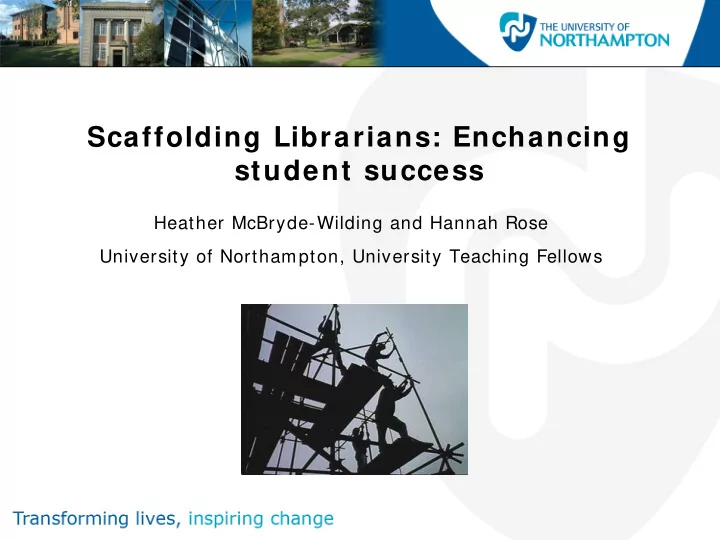

Scaffolding Librarians: Enchancing student success Heather McBryde-Wilding and Hannah Rose University of Northampton, University Teaching Fellows
Background Collaborative project took place between the Department of Information Services and the School of Education during 2009/ 10, to address challenges faced by students as they made the transition to HE study. The following were concerns for the Library: • Students’ low level of engagement with library resources and support – identified during informal discussions with the course leader and module tutors. • Students expressing slightly less satisfaction with library facilities compared to the rest of the university in the University’s Internal Student Survey (ISS).
W hat did the project involve? Initially the course leader surveyed a new cohort of undergraduates to ascertain their previous experience of: • Support for assignments • Library usage • Information Skills support e.g. Internet searching advice Initial survey distributed to Yr 1 teacher training students and a similar picture obtained regarding students limited previous use of, and research experience in libraries.
Library interventions for new cohort • Librarian attended welcome session • Library tour • Information skills session – week 2 • Harvard referencing session • Assignment support sessions for 2 modules • Assignment support guides • Timetabled drop-in support • Open door policy access to Academic Librarians • Opportunity to book one-to-one appointments with Academic Librarians New provision Existing provision
End of year feedback 64% of students found the assignment support sessions useful, or very useful 67% of students found the assignment support sheets useful, or very useful Improved Internal Student Survey scores: Improved student retention!
Sharing good practice Following positive outcomes we were keen to disseminate – UoN Learning and Teaching Conference (transitions theme) – Journal article publication. On submission of article for peer review 3 questions were raised: Patronising? Tim e intensive? Spoon feeding? Students did not have this Yes, but time Not intended, concern saved so what were elsewhere we doing?
The theory behind the practice.... Scaffolding: ‘An important aspect of scaffolding instruction is that the scaffolds are tem porary . As the learner’s abilities increase the scaffolding provided by the more knowledgeable other is progressively w ithdraw n . Finally the learner is able to complete the task or master the concepts independently.’ (Chang et al ., 2002 cited in Van Der Stuyf, 2002, p.2)
Further developm ents Following initial success we were concerned to continue listening to the student voice and work with the course team to inform future practice: Focus groups with students, informal student feedback in sessions, evidence from submitted assignments and course team reflection meetings. • Welcome leaflet – pre-arrival (service/ expectations mismatch) • Activity based induction (size of library concerns) • Activity based referencing sessions (hands-on practice) • Collection development work (comments about number, age and availability of books) • Ongoing support in year 2 – dip in confidence at start requires underpinning (informal session feedback) • Used Yr 2 student mentors in Yr 1 sessions • Agreed action plan for ECS information skills support
W ho has picked up on our research? ‘Universities can no longer rely on conventional assumptions about students’ motivations and abilities, and need to adopt more proactive strategies to understand these’. (Carey, 2012, p.2) Carey. P . (2012) Student engagement: stakeholder perspectives on course representation in university governance. Studies in Higher Education. (Forthcoming publication) Arcadia Project brought together professionals in Cambridge to provide inspirational, thought provoking debate on the future of the research library in the digital age. Secker, J. & Coonan, E. (2011) A New Curriculum for Information Literacy. Curriculum and supporting documents Arcadia Project, Cambridge University library. Available from: http: / / arcadiaproject.lib.cam.ac.uk/ publications.html (Evidence toolkit for implementing the curriculum. p.24)
Scaffolding Librarians
References Carey. P . (2012) Student engagement: stakeholder perspectives on course representation in university governance. Studies in Higher Education. (Forthcoming publication) Chang, K., Chen, I., & Sung, Y . (2002). The effect of concept mapping to enhance text comprehension and summarization. The Journal of Experimental Education. 7 1 (1), 5-23. Cited in Van Der Stuyf, R. (2002) Scaffolding as a teaching strategy. Adolescent Learning and Development. Fall, 2-13. Lumsden, E., McBryde-Wilding, H. and Rose, H. (2010) Collaborative practice in enhancing the first year student experience in Higher Education. Enhancing the Learner Experience in Higher Education [ online] , 2 (1), 12-24. Available from: http: / / journals.northampton.ac.uk/ index.php/ elehe/ index [ Accessed 13 December 2010] . Lumsden, E., McBryde-Wilding, H. and Rose, H. (2010) Transitional Dialogues: An evaluation of the impact of collaborative practice in enhancing the first year student experience of assessment in Higher Education. In: University of Northampton Learning and Teaching Conference 2010: Learning Dialogues , Thursday 13 th May 2010. Northampton: University of Northampton. Secker, J. & Coonan, E. (2011) A New Curriculum for Information Literacy. Curriculum and supporting documents Arcadia Project, Cambridge University library. Available from: http: / / arcadiaproject.lib.cam.ac.uk/ publications.html (Evidence toolkit for implementing the curriculum. p.24)
Recommend
More recommend